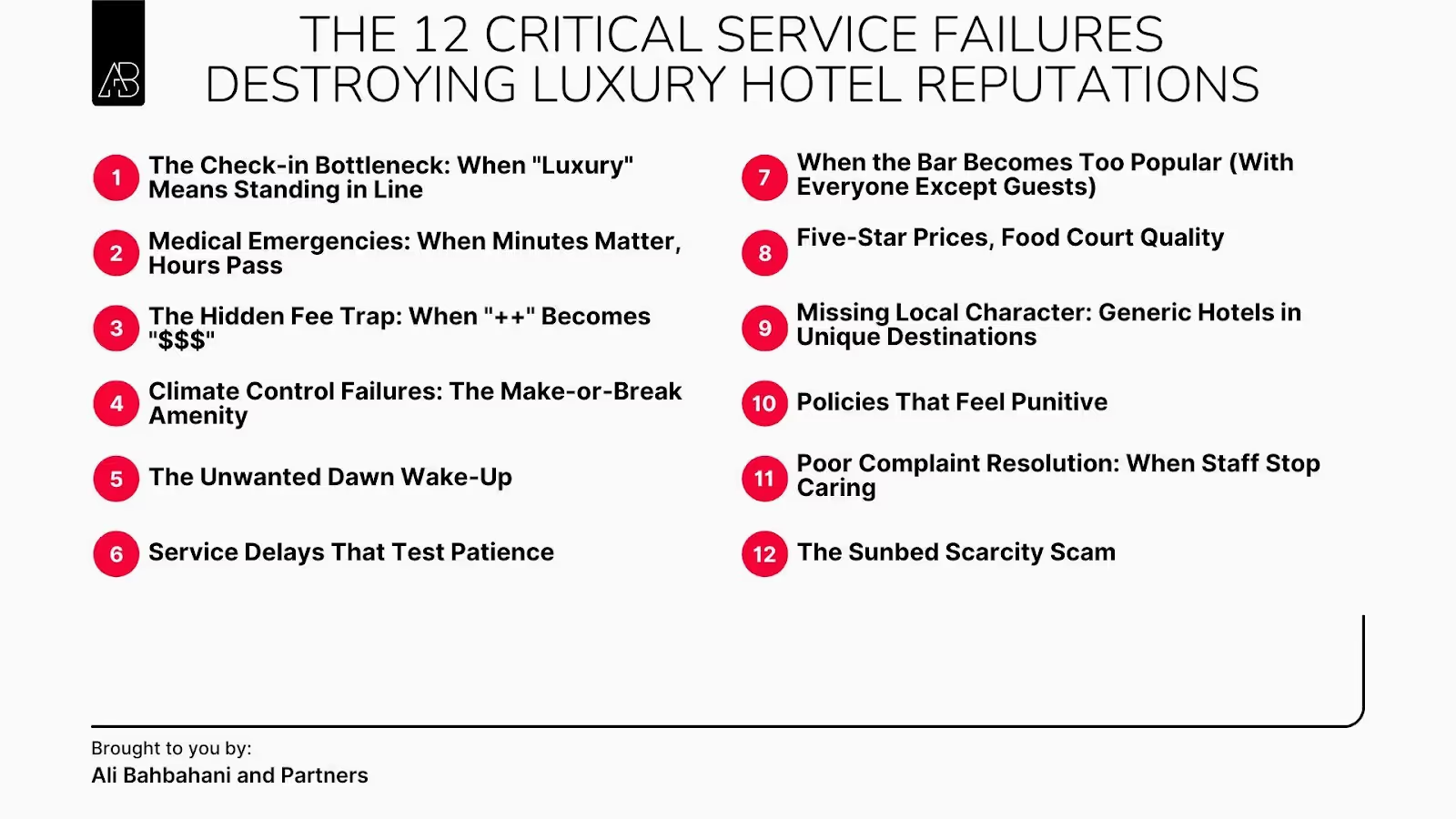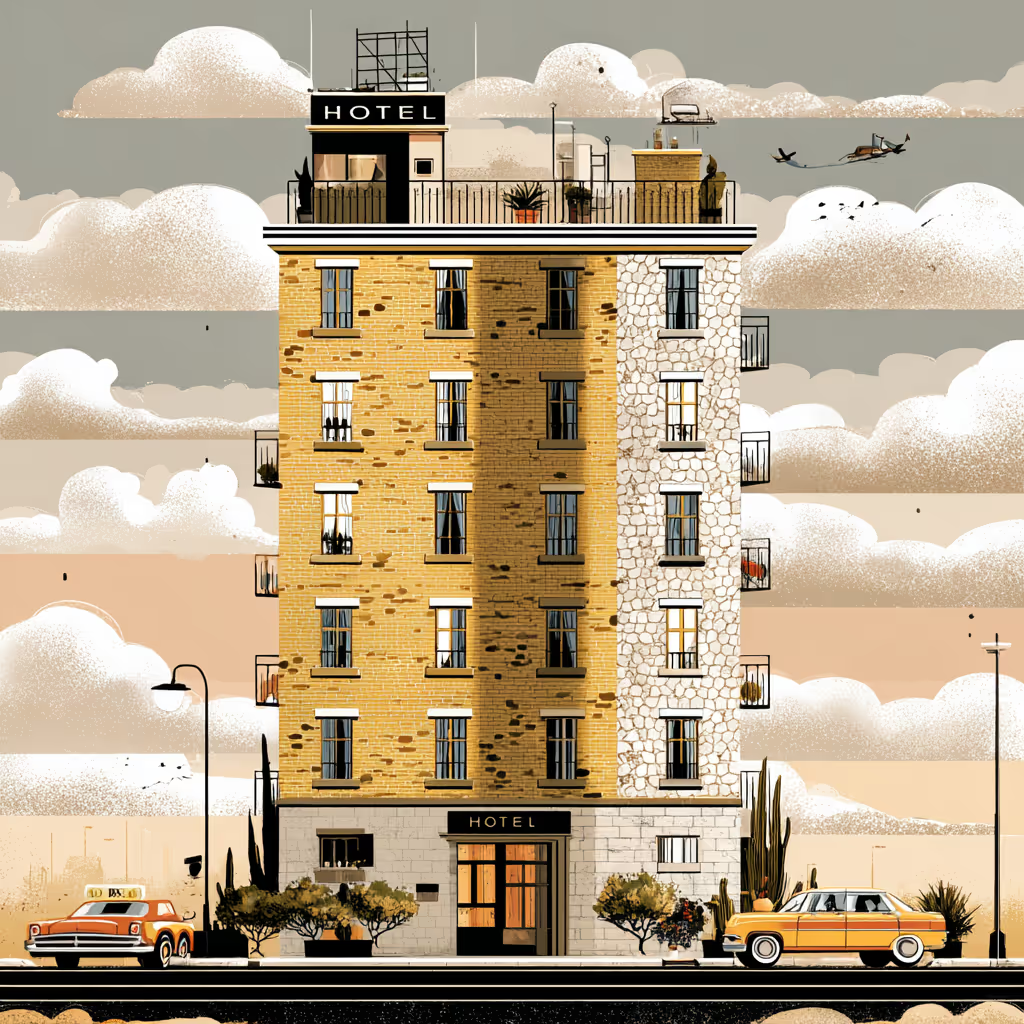Why Your Five-Star Hotel Gets One-Star Reviews
.avif)
Based on personal stays between 2021 and 2025 and publicly available guest reviews.
Picture this: A weary executive arrives at a luxury resort after a 14-hour flight, dreaming of the seamless welcome your marketing promises. Instead, she stands in a crowded lobby for 35 minutes while the front desk wrestles with an aging property management system. By the time she reaches her suite, your promise of effortless luxury is already broken.
-2.avif)
This scene plays out daily across luxury properties worldwide. From hidden fees that gut trust at checkout to air conditioning failures that turn premium suites into saunas, operational blind spots are shredding reputations and driving away high-value guests.

The Hidden Cost of Operational Failures
What would happen to your RevPAR if even two of these failures disappeared overnight?
Consider these statistics:
- 94% of travelers avoid a business after reading a negative review
- Satisfaction drops 47% once check-in wait times exceed five minutes
- A one-point improvement in review scores enables an 11.2% rate increase without occupancy loss
Each operational failure doesn't just damage your reputation; it decimates revenue.

The 12 Critical Service Failures Destroying Luxury Hotel Reputations

1. The Check-in Bottleneck: When "Luxury" Means Standing in Hotel Line
The Reality:
At Mandarin Oriental Dubai, guests recently spent 20-30 minutes standing while reception attempted to cross-sell suites and spa packages. At Le Méridien Lav Split, the "Platinum check-in" for elite guests took longer than the regular queue, rendering the VIP service an ordeal. (Note: Mandarin Oriental has since introduced mobile check-in options at select properties.)
Why It Matters:
First impressions anchor the entire stay. Guest satisfaction drops 47% once lobby wait time exceeds five minutes. Additionally, 40% cite slow check-in as their top hotel frustration.
The Fix:
- Implement elevator or in-room check-in with paperwork completed while guests are seated
- Deploy pre-arrival digital processing with passports scanned and cards pre-authorized
- Provide mobile keys so VIPs and repeat guests bypass the desk entirely
- Create private lounges for registration formalities
Best Practice:
Top-tier properties greet guests curbside and finish formalities in the suite itself. Check-in should feel like arriving at a friend's home, not a municipal office.

2. Medical Emergencies: When Minutes Matter, Hours Pass
The Horror Story:
At Le Méridien Lav Split, a guest with a severe fever waited three hours while staff "looked for" an on-call doctor, followed by another 30-minute delay, without a single status update throughout the crisis.
Why This Is Catastrophic:
Medical emergencies reveal a hotel's steadfast commitment to service. Only 33% of hotels worldwide have formal emergency planning policies, leaving two-thirds potentially unprepared for medical crises.
The Fix:
- Maintain verified 24/7 clinician lists with 30-minute response SLAs
- Conduct annual first aid training for all staff
- Empower duty managers to call ambulances without GM approval
- Provide live updates to guests or companions every 10 minutes until resolved
- Establish relationships with nearby medical facilities
Best Practice:
True luxury means a doctor at your door within 30 minutes, no excuses, no bureaucratic delays.

3. The Hidden Fee Trap: When "++" Becomes "$$$"
The Reality:
At Ritz-Carlton South Beach, a $30 "resort fee" for parking sparked negative reviews. The dreaded "++" can transform a $100 dinner into a $250 shock, eroding trust at checkout. (The property has since clarified fee structures in pre-arrival communications.)
The Impact:
86% of Americans believe hotels should show all fees upfront, and 31.5% of travelers abandon the booking funnel as soon as unexpected fees appear.
The Fix:
- Display all-inclusive pricing (including tax and service) from the first touchpoint
- Absorb basic amenities (WiFi, pool towels, parking) into room rates
- Ensure all menus and QR codes show final prices, not teasers
- Eliminate surprise charges at checkout
Best Practice:
Premium brands are shifting to transparent, all-inclusive pricing. Nothing erodes trust faster than a surprise surcharge.

4. Climate Control Failures: The Make-or-Break Amenity
Design Disasters:
- At Cape Bodrum Beach Hotel, rooms hovered at 27°C despite promises of luxury comfort. Management was aware of the AC problems but continued to sell rooms, choosing profits over the guest experience. (The property has since been reclassified from five to four stars.)
- At Ritz-Carlton South Beach, an AC unit was positioned to obstruct the premium suite's balcony view, form over function gone wrong.
Why It's Critical:
In Gulf summers, sleep depends on chilled air, not thread count. Seventy-four percent of hotel guests say that poor heating, ventilation, or air conditioning would keep them from ever returning.
The Fix:
- Oversized HVAC systems with predictive maintenance sensors
- Pull any room from inventory at the first AC alert
- Keep portable units on standby for emergencies
- Design with both aesthetics and airflow in mind
- Never sell rooms with known climate control issues
Best Practice:
Guests should adjust thermostats down, not call engineering at 2 AM.

5. The Unwanted Dawn Wake-Up
Design Failure:
Cape Bodrum's curtains covered only 90% of the windows, letting sunrise stream in at 5:20 AM.
Why It Matters:
In luxury hospitality, sleep quality is non-negotiable, and light leakage is one of its most common disruptors. A 2024 poll found that 35% of Americans say indoor light keeps them awake “always” or “often.” Among frequent travelers, blackout drapes are ranked as one of the top three amenities, alongside mattress quality and air conditioning.
The Fix:
- Install floor-to-ceiling blackout drapes with side channels
- Deploy motorized blinds in suites for complete light control
- Test every room for total darkness capability
Best Practice:
Leading brands mandate comprehensive blackout solutions as standard. Sleep isn’t just a comfort feature; it’s a core part of perceived value, especially for business and wellness travelers.

6. Service Delays That Test Patience
Luxury Lost:
Recent experiences at Ritz-Carlton St Thomas property:
- 30 minutes for a bottle of water
- 20 minutes for golf cart pickup
- 60 minutes for luggage collection at checkout
- 20 minutes for valet service
Why It Matters:
When rooms exceed US$700 per night, "We're understaffed" is an unacceptable excuse. 40% of consumers expect a brand's social media reply within one hour; 79% expect it on the same day.
The Fix:
- Establish 15-minute SLAs for routine requests, tracked in real-time
- Implement surge staffing plans for peak periods
- Empower any associate to redirect resources when SLAs are at risk
- Use technology to predict and prevent bottlenecks
Best Practice:
In genuine luxury, guests never wait. Every request should be treated as urgent.

7. When the Bar Becomes Too Popular (With Everyone Except Guests)
The Problem:
Carlton Cannes' bar attracts locals and tourists in droves, leaving house guests circling for seats. While a buzzing venue may seem positive, alienating guests who pay €1,000 per night is shortsighted.
The Impact:
51% of business travelers rank hotel bars among their most anticipated amenities, and 75% of luxury guests expect priority access to facilities.
The Fix:
- Reserve 50% of seating for hotel residents
- Create guest-only sections during peak hours
- Implement QR-based reservations prioritizing in-house guests
- Balance vibrancy with exclusivity
Best Practice:
Maintain a pleasant atmosphere while ensuring that guests always have priority access to the facilities they're paying for.

8. Five-Star Prices, Food Court Quality
The Breaking Point:
At LUX* Maldives, a room service shawarma plate priced at US$250 delivers street food at Michelin prices.
The Fix
- It’s critical to post-meal satisfaction scores, not just food cost
- Conduct quarterly price-to-value audits versus local fine dining
- Implement real-time feedback QR codes on receipts
- Ensure quality matches pricing at every touchpoint
Best Practice:
If you charge $250 for shawarma, it must be transformative. The luxury hospitality boom is raising expectations, value and quality must align at every price point.

9. Missing Local Character: Generic Hotels in Unique Destinations
Kuwait's Cultural Void:
Most five-star properties in Kuwait could exist anywhere globally, characterized by minimal local art, cuisine, or staff that fail to signal their place. Hotels often feel disconnected from the community, except for those serving as wedding venues.
Lost Opportunities:
Nearly 70% of affluent travelers say modern luxury hotels have 'lost their soul to standardization'.
The Fix:
- Collaborate with local artists, chefs, and cultural ambassadors
- Hire and develop local talent into visible guest-facing roles
- Create weekly cultural experiences open to guests and the community
- Design spaces that celebrate, not ignore, their destination
Best Practice:
Hotels that embrace local culture experience increased customer satisfaction. Your hotel should be the first chapter of the destination experience.

10. Policies That Feel Punitive
Dress Code Disasters:
Requiring dinner jackets at beach resorts in 40°C weather isn't refinement, it's tone-deafness. Seventy-nine percent of U.S. employees work under casual or business-casual attire codes.
The Fix:
- Establish climate-appropriate guidelines ("smart resort casual" vs. "black tie")
- Communicate dress codes pre-arrival
- Provide loaner items for those seeking formality
- Prioritize guest comfort over arbitrary standards
Best Practice:
Align policies with location and climate. A beach resort requiring ties at dinner fights against its own identity.

11. Poor Complaint Resolution: When Hotel Staff Stop Caring
Service Philosophy Failure:
When a Le Méridien Lav guest sought help with missing airline luggage, staff responded they were "too busy to assist with matters unrelated to the hotel," demonstrating a fundamental misunderstanding of luxury hospitality.
The Impact:
Hotels that answer guest reviews are 21% more likely to receive a booking enquiry on TripAdvisor.
The Fix:
- Create service recovery budgets accessible to every supervisor
- Implement 24-hour follow-up rules for any complaint
- Conduct monthly pattern analysis to address root causes
- Train staff as guest advocates, not policy enforcers
Best Practice:
A resolved complaint often creates more loyalty than a flawless stay. See problems as opportunities to demonstrate exceptional service.

12. The Sunbed Scarcity Scam
The Capacity/Pricing Mismatch:
Carlton Cannes charges €60 for pool beds and up to €200 for beach loungers, yet stocks only 120 beds for 300 rooms. 60% of travelers hate chair-hogging.
The Fix:
- Guarantee one lounger per occupied room, built into rates
- Deploy smart reservation apps with real-time inventory
- Maintain overflow stock for high-occupancy periods
- Include amenities in room rates rather than monetizing scarcity
Best Practice:
Don't create artificial scarcity. As luxury expectations rise, transparency and guaranteed access to core amenities are becoming non-negotiable.

The Excellence Contrast: Learning from Success
Whether Villa Igia forward thining or the Four Seasons Grand Hôtel du Cap-Ferrat demonstrates operational excellence:
- Proactive Service: Staff offer upgrades unprompted when preferences are spotted
- Anticipatory Care: Spa slots and tables pre-booked based on past stay data
- Relationship Continuity: The same associate manages the entire guest journey
Result:
Top-decile Net Promoter Scores and rates 18% above local competitors, proof that operational polish converts directly to pricing power.
Turning Excellence into Competitive Advantage
These aren't isolated incidents; they are industry-wide failures that savvy hotels can capitalize on for a competitive advantage. While competitors frustrate guests with basic failures, properties that excel can command premium rates and enjoy fierce loyalty.
The truth is simple: Fixing these issues costs far less than the revenue lost from dissatisfied guests. Every failure can be traced back to the exact root cause: prioritizing short-term profit over the guest experience. Visionary hoteliers invert that equation: guest satisfaction first, profits follow.

Looking Ahead: Emerging Challenges for 2026-2027
The hospitality industry faces critical technological challenges that require immediate attention to avoid significant financial losses. Seamless e-check-in systems eliminate lobby queues but carry substantial risks, as guests abandon apps if check-in exceeds 90 seconds and data breaches can reduce room rates by 14% for six months. Hotels must implement encrypted mobile ID systems while maintaining visible staff to resolve technical failures within 60 seconds.
IoT proliferation creates personalized guest experiences through smart thermostats and voice assistants, but 28% of luxury stays now experience technology malfunctions. Properties need unified operations platforms for predictive maintenance and engineering teams trained for 15-minute "shadow restarts." Smart room features like automated shades and circadian lighting often generate more complaints than manual systems when they malfunction, requiring weekly recalibration cycles and guest override controls.
Dynamic pricing algorithms that adjust rates hourly have created trust issues, with 52% of affluent travelers challenging front-desk bills. Hotels should offer 24-hour rate-lock guarantees and display recent rate ranges during booking. The shift toward electric vehicles demands significant infrastructure planning, as half of luxury rentals in GCC markets will be electric by 2027, requiring one fast charger per 25 rooms and valet EV-swap services.
Finally, sustainability claims without verifiable data face scrutiny under new EU guidelines that brand unsubstantiated carbon-offset claims as greenwashing. Hotels must adopt third-party carbon-tracking dashboards, publish comprehensive sustainability scorecards, and tie executive bonuses to energy efficiency metrics to ensure accountability in their environmental commitments.
Partner with Proven Expertise
At Ali Bahbahani & Partners, we've spent years mapping guest journeys and closing these gaps across Kuwait and the Gulf region. We understand that fixing these issues requires more than good intentions; it demands systematic change, cultural transformation, and unwavering commitment to excellence.
Our 360° Solution:
- Deep-Dive Operational Audits to surface hidden pain points
- Cross-Department Journey Mapping to eliminate friction
- Tailored Staff Training that transforms service scripts into human moments
- Smart Technology Integration for Invisible Efficiency
- Continuous Monitoring to lock in gains and prevent regression
Ready to Transform Your Property?
Because in luxury hospitality, "good enough" is one star too low.
Contact Ali Bahbahani & Partners
Have hospitality insights or challenges? We’d love to hear from you. Contact us to discuss how we can elevate your property to the level of actual luxury.

.webp)

